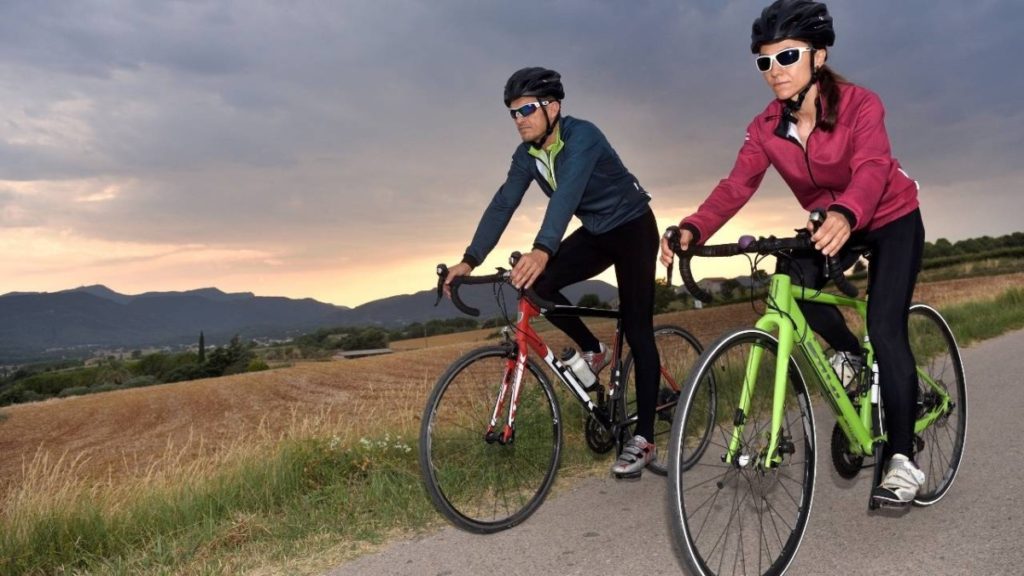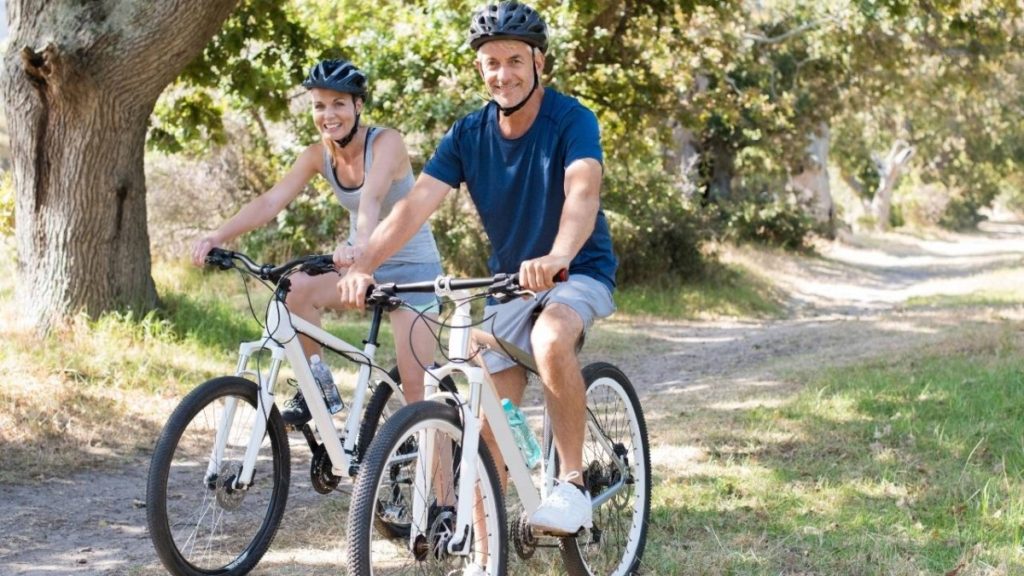
Before heading out the door on a long bike ride, you might want to know how long it will take to complete your route or how you match up against people of similar age and gender. The average time it takes to cycle 20km massively depends on a few factors, such as your fitness level, terrain, weather conditions and bike type. Your gender does come into play, but it isn’t a significant factor.
A cyclist with an average fitness level who rides 20km on flat ground in good weather should easily cover the distance in around 50-60 minutes with an average speed of 16-20km/h (10-12 mp/h), if not faster. Generally, males tend to be 10-15 minutes faster than females in similar age groups.
If you’re looking to cycle 20km in a relatively fast time, you’ll want to know the average duration. You can find all sorts of information on cycling times and distances, but it really varies depending on each individual. I’ve broken down the article to include males and females across all age groups so you can better understand how you compare.
Table of Contents
What is the Average Time to Cycle 20km For Males and Females

On average, it takes a male between 49 and 58 minutes to cycle 20km. However, it depends on their age, weight and overall fitness levels. For instance, a male that is aged between 30-34 can expect a 20km cycling time of 49 minutes. For a male that is aged 40-44 can expect around 51 minutes.
| Age | Average Time To Cycle 20km in Minutes (Males) |
| 15-19 | 49.00 |
| 20-24 | 48.00 |
| 25-29 | 48.40 |
| 30-34 | 49.10 |
| 35-39 | 50.00 |
| 40-44 | 51.00 |
| 45-49 | 53.00 |
| 50-54 | 53.20 |
| 55-59 | 56.00 |
| 60-65 | 58.20 |
On average, it takes a female between 58 and 70 minutes to cycle 20km. However, it depends on their age, weight and overall fitness levels. For instance, a female that is aged between 30-34 can expect a 20km cycle time of 60 minutes. For a female that is aged 45-50 can expect around 62 minutes.
| Age | Average Time To Cycle 20km in Minutes (Females) |
| 15-19 | 62.00 |
| 20-24 | 58.00 |
| 25-29 | 60.00 |
| 30-34 | 60.40 |
| 35-39 | 61.00 |
| 40-44 | 61.30 |
| 45-49 | 62.20 |
| 50-54 | 68.40 |
| 55-59 | 69.00 |
| 60-65 | 70.00 |
The average time to cycle 20km for men and women will differ based on a few aspects. The most significant factor is age, with younger cyclists generally being able to complete the distance faster than older cyclists. Most individuals’ fitness peaks in their late 20s to early 30s, but we are more consistent with our training in our late 30s and 40s because we understand the importance of health.
Other essential factors include weight and fitness levels. Heavier cyclists will generally take longer to complete 20km than lighter cyclists, all else being equal. The same applies to those with lower fitness levels; it will take them longer to complete the distance than someone who is more fit and bikes regularly.
The type of bike you are using and the terrain can also affect your cycling time. A road bike will generally be faster than a mountain bike by around 10-15%, and flat terrain will be faster than hilly terrain by 30-40%. Therefore, unless you ride the identical 20km route every time, your times will vary. The only time you can be consistent with your time is if you cycle on an exercise bike, as this will always be the same.

How Many Calories Will You Burn Cycling 20km
On average, if you cycle 20km at a moderate pace at a speed of 19kph-30kph, you can expect to burn around 650 calories. The number of calories you burn cycling 20km will depend on your weight, gender and pace. A person who weighs 190 pounds and bikes 20km in 60 minutes will burn about 680 calories. A person who weighs 240 pounds and cycles 20km in 55 minutes will burn about 800 calories.
| Weight (pounds) | Calories Burned for cycling 20km |
| 160 | 580 |
| 170 | 620 |
| 180 | 660 |
| 190 | 680 |
| 200 | 720 |
| 210 | 760 |
| 220 | 800 |
| 230 | 840 |
| 240 | 900 |
| 250 | 960 |
This number will, of course, differ from individual to individual as it depends on their weight and other physical factors. Nevertheless, 20km on a bike will help you achieve your fitness goals and also help in weight management.
In such situations, going for a more vigorous workout and increasing time limits is not the answer. Rest assured, your weight is sweating away in the right direction; a little patience will help you see it.

Can You Lose Weight Cycling 20km?
On average, you need to burn 3500 calories to lose one pound of body weight. Cycling 20km daily will burn approximately 4550 calories, meaning you would lose around 1.5 pounds weekly. Obviously, this highly depends on your diet and other physical activity, but it’s a good starting point.
Losing weight is all about creating a calorie deficit, and 20km of cycling daily will help you do that. Remember that you need to be in a calorie deficit for an extended period to see considerable results. So, if you’re looking to lose weight, ensure you’re also eating healthy and not overeating, mainly because you will feel hungry from all the extra cycling.
The best way to lose weight from cycling is to combine diet with regular cycling. Instead of cycling 20km every day, you could cycle 30 minutes every day if you are short on time or haven’t been exercising regularly for a while. Eating around 250-500 calories less every day will help you lose 1-2 pounds a week.
It is important to note that you shouldn’t try to lose weight too quickly as this can be unhealthy and lead to rebound weight gain. A healthy rate of weight loss is around 1-2 pounds per week. Anything more than that, and you risk losing muscle mass instead of fat.

Is Cycling 20km a Day Good?
If your primary goal is to lose weight and gain fitness, then cycling 20km every day is fine. Cycling 20km a day is good for your health. It can help you lose weight, tone your muscles, and improve your cardiovascular fitness. However, it is important to remember that overtraining can lead to injury and fatigue.
The world health organisation guidelines on exercise levels state a minimum of 150 minutes of exercise each week. The average is around 300 minutes, and the elite is 500 minutes. Cycling 20km daily puts you in the above-average range for exercise levels, which will be amazing for your health and fitness.
Alternatively, you can ride your bike 5 times a week and have 2 days of rest. This will give your body time to recover and prevent overtraining but still burn enough calories to lose weight. If you ride your bike to work, you might find it easy to cycle 20km daily.
You don’t need to cycle your bike the entire 20km all at once. You can break it up into smaller rides throughout the day. For example, you could cycle 5km in the morning, 5km at lunch, and 10km after work. This would still give you the same health benefits as riding 20km all at once but wouldn’t be as tiring or time-consuming.

What Are the Benefits of Cycling 20km a Day?
Cycling 20km a day has many benefits for your health. It can help you lose weight, tone your muscles, and improve your cardiovascular fitness. Additionally, cycling is a low-impact form of exercise which means it is easy on your joints. This makes it a great option for people who are overweight or have joint problems.
Cycling 20km a day is also good for your mental health. Exercise has been shown to improve mood and reduce stress. This is because it releases endorphins which are the body’s natural painkillers. So, if you’re feeling down or stressed, a bike ride can help you feel better.
Additionally, cycling 20km a day can help improve your sleep. This is because exercise tires your body out and makes it easier to fall asleep. Getting enough sleep is important for your overall health as it helps your body recover from exercise and reduces stress levels.
Finally, cycling 20km a day can help you save money. This is because it is a form of active transportation which means you use your own power to get around. This can save you money on gas or public transportation costs. Additionally, cycling can help you stay healthy which can save you money on healthcare costs in the long run.



